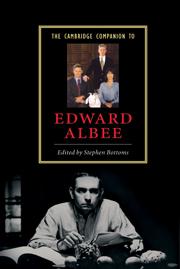Book contents
- Frontmatter
- 1 Introduction
- 2 Albee’s early one-act plays
- 3 Who’s Afraid of Virginia Woolf?
- 4 “Withered age and stale custom”
- 5 Albee’s 3½
- 6 Albee’s threnodies
- 7 Minding the play
- 8 Albee’s monster children
- 9 “Better alert than numb”
- 10 Albee stages Marriage Play
- 11 “Playing the cloud circuit”
- 12 Albee’s The Goat
- 13 “Words; words... They’re such a pleasure.” (An Afterword)
- 14 Borrowed time
- Notes on further reading
- Select bibliography
- Index
- Series List
3 - Who’s Afraid of Virginia Woolf?
Toward the marrow
Published online by Cambridge University Press: 28 May 2006
- Frontmatter
- 1 Introduction
- 2 Albee’s early one-act plays
- 3 Who’s Afraid of Virginia Woolf?
- 4 “Withered age and stale custom”
- 5 Albee’s 3½
- 6 Albee’s threnodies
- 7 Minding the play
- 8 Albee’s monster children
- 9 “Better alert than numb”
- 10 Albee stages Marriage Play
- 11 “Playing the cloud circuit”
- 12 Albee’s The Goat
- 13 “Words; words... They’re such a pleasure.” (An Afterword)
- 14 Borrowed time
- Notes on further reading
- Select bibliography
- Index
- Series List
Summary
Love had a thousand shapes. There might be lovers whose gift it was to choose out the elements of things and place them together and so, giving them a wholeness not theirs in life, make some scene, or meeting of people (all now gone and separate), one of those globed compacted things over which thoughts linger, and love plays.
Virginia Woolf, To the LighthouseBefore they slept, they must fight; after they had fought, they would embrace. From that embrace, another life might be born. But first they must fight, as the dog fights with the vixen, in the heart of darkness, in fields of night.
Virginia Woolf, Between the ActsWho's Afraid of Virginia Woolf? (1962) is Edward Albee's most affirmative play. Given the accusatorial narrative animating the play, calling this his most affirmative work may seem a bit curious. After all, George and Martha, and Nick and Honey, are characters who take delight in attacking others, in belittling those whose self-interests differ from their own, and in betraying those whose conceptions of reality differ from their own. Irony and sarcasm are born from characters who increasingly obey compulsions they seek to resist. And those compulsions have become so suffused within their language and action that these characters have devolved, in the Beckettian sense, into habit, their routines anesthetizing their responses to the self, the other, and the culture they inhabit.
- Type
- Chapter
- Information
- The Cambridge Companion to Edward Albee , pp. 39 - 58Publisher: Cambridge University PressPrint publication year: 2005
- 1
- Cited by

